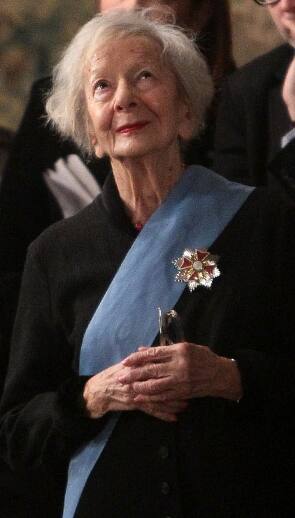



Everybody has a book in them, and in most cases that's where it should stay. That maxim has been attributed to both Karl Kraus and Christopher Hitchens. Given her ironic tone often rooted in everyday realities, one feels that Polish Nobel Prize-winning poet Wisława Szymborska would have approved.
In one of her poems, she asks: what is poetry anyway? “More than one rickety answer / has tumbled since that question first was raised,” she continues. “But I just keep on not knowing, and I cling to that / like a redemptive handrail.” Handrails are what aspiring writers of poetry or fiction often reach for. These, of a kind, are what Szymborska provides in How to Start Writing (and When to Stop), newly translated into English by Clare Cavanagh.
The book is a selection from Literary Mailbox, an anonymous column that initially appeared in the Polish magazine Zycie literackie (Literary Life) from 1968 to 1981. It’s in the form of answers to mail from would-be writers, some looking for advice and many seeking an assessment of submitted work. All are written in first-person plural; as Szymborska explained, “I couldn’t use feminine forms since I was the only woman on the editorial board. They’d have spotted me instantly”.
The pieces are a delight, and the temptation to quote from them at length is irresistible. Many are droll put-downs of amateurish first attempts, often containing nuggets of insight. When the volume was first published in Poland, Szymborska was modest in her assessment. Their didactic value was minimal and “it’s mainly entertainment”, she commented. They’re certainly entertaining, but as Cavanagh points out in her introduction she is also preoccupied here, as in her other work, “with the relationship between poetry and the daily life that surrounds it, feeds it, and sometimes altogether ignores it”.
As Szymborska writes to one Ula from Sopot: “Poetry, like all literature for that matter, derives its vital energies from the world we live in, from events experienced, trials endured, ideas conceived.” She goes on: “The world must always be described anew, since it is never what it used to be, if only because we ourselves are new to it.”
To those striving to make their poems sound poetic, such as one B. L. from Wrocław Province, she says: “The fear of straight speaking, the constant, painstaking efforts to metaphorize everything, the ceaseless need to prove you’re a poet in every line: these anxieties beset every budding bard.” To another correspondent, she makes the same point: “Being ‘poetical’ is the reigning sin of novice poets. They fear simple sentences, they make things difficult for themselves and others.”
Elsewhere, she can be more brusque. To one hapless poet manqué she declares: “You treat free verse as a free-for-all. This worries us.” To another, she writes: “poetry…is, was, and will always be a game. And as every child knows, all games have rules. So why do the grown-ups forget?” And to an aspiring writer of fiction from Sopot, she points out: “Your stories are cramped, stuffy, and simplistic. There is no window on the world, hence no chance it might be opened. This is bad. A snappy style won’t save you.”
There is much tongue-in-cheek wickedness, too. To a seeker from Kudowa who asks her to recommend a novel writing guide, she says that she has none. “We hear such things appear in the United States, but we make bold to question their worth for one simple reason: wouldn’t any author who possessed a fail-proof recipe for literary success rather profit from it himself than write guidebooks for a living? Right? Right.”
Can writing be taught, then? For her, literature holds no technical secrets, or at least secrets that can’t be plumbed by a gifted amateur. Of course, she goes on, talent requires tips and pointers, especially at the start, but a genuine sense for what works and why is a matter of wide reading and, above all, instinct. “We take the liberty of saying this after long years of observation.”
 (Photo via Wikimedia Commons)
(Photo via Wikimedia Commons)Clearly, Szymborska didn’t believe in sugar-coating feedback. It’s also evident that she took the time and trouble to carefully read through submissions before offering advice. There are also words of encouragement, hopes that the person will continue writing, and on at least one occasion, “if you’re ever in Kraków, come visit our office”.
Many of her sentiments are timeless. Talent isn’t limited to inspiration, she writes to one correspondent. “All of us get inspired at times, but only the truly talented spend long hours over a piece of paper struggling to improve the muse’s dictates.” To another who scribbles with “carefree ease”, she recommends: “Try chewing your pencil and staring out the window in despair every so often.” In the same vein, to one who thinks that acquiring a typewriter will make his verses better: “Your plan for typing out poems en masse troubles us.”
Perhaps her wisest counsel is for those obsessed with getting published. “It’s a shame that every more or less gracefully formulated sentence must pay off instantly. What if the payoff comes only ten or twenty years later? And what if this well-wrought phrase never reaps dividends in any public sense, but supports the writer in dark hours and enriches his life? Does that count for nothing?” Well worth taking to heart.
Discover the latest Business News, Sensex, and Nifty updates. Obtain Personal Finance insights, tax queries, and expert opinions on Moneycontrol or download the Moneycontrol App to stay updated!
Find the best of Al News in one place, specially curated for you every weekend.
Stay on top of the latest tech trends and biggest startup news.